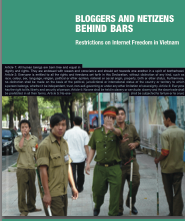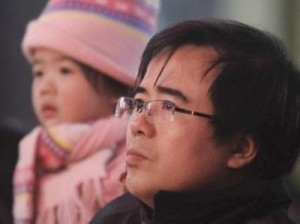June 19, 2013
Kerry must press Vietnam to release dissident blogger, say NGOs
Democracy Digest
17.6.2013
US Secretary of State John Kerry should press Vietnam’s government to free a leading human rights defender, when he attends the ASEAN conference later this month, says a broad coalition of NGOs.
In an open letter released today, the groups call on the Obama administration to demand the release Mr. Le Quoc Quan (above), a qualified lawyer and active blogger, who was arbitrarily detained , for “having exercised his right to freedom of expression, his right to freedom of peaceful assembly and association, as well as his activities as a human rights defender.”
On his popular blog, Quan exposes human rights abuses commonly ignored by Vietnamese state media, says the letter, which is signed by Article 19, Electronic Frontier Foundation (EFF), English PEN, Freedom House, Frontline Defenders, Lawyers for Lawyers (L4L), Lawyers’ Rights Watch Canada, Media Defence South East Asia, Media Legal Defence Initiative (MLDI), the National Endowment for Democracy (NED), Reporters Without Borders, and the World Movement for Democracy:
Prior to being disbarred in 2007, Mr. Quan defended human rights cases in court. Upon his return from the United States, he was arrested in 2007 and detained for 100 days. In April 2011, he was arrested again and ultimately released without charges. In August 2012, Mr. Quan was severely injured because of a violent attack, by – he believes – State agents. On 27 December 2012, Mr. Quan was arrested and charged for what he believes are false charges of ‘tax evasion’. He has been detained incommunicado in a Hanoi prison for the first two months. At this moment, Mr. Quan is still imprisoned. His trial will take place on 9 July 2013.
 Vietnamese police in Hanoi arrested another leading blogger, Pham Viet Dao, last week on charges of anti-state activity for posting “erroneous and slanderous” information about the Communist regime, according to news reports. Dao, 61, was accused of violating Article 258 of the Vietnam’s penal code for “abusing democratic freedoms,” the Ministry of Public Security said in a statement.
Vietnamese police in Hanoi arrested another leading blogger, Pham Viet Dao, last week on charges of anti-state activity for posting “erroneous and slanderous” information about the Communist regime, according to news reports. Dao, 61, was accused of violating Article 258 of the Vietnam’s penal code for “abusing democratic freedoms,” the Ministry of Public Security said in a statement.
Dao’s arrest follows that of blogger Truong Duy Nhat, who was detained under similar accusations in late May.
“The arrest of a second blogger within a month shows the intensifying crackdown on critical dissent in Vietnam,” said Joel Simon, executive director of the Committee to Protect Journalists. “While the Internet has been an outlet for dissent in Vietnam, the limited space is rapidly closing.”
“The trend-lines show a worsening situation in Vietnam,” said John Sifton, Asia advocacy director at the lobby group, and urged Washington to suspend trade negotiations with Vietnam as part of the Trans-Pacific Partnership trade bloc unless substantial improvements in the rights situation are made.
Vietnam’s foreign ministry rejected criticisms of its human rights record.
“But faced with the growing spread of the Internet and lively online debates, Vietnamese authorities have tried to open up alternative channels for criticism,” notes analyst James Hookway:
The country’s National Assembly last week held its first ever confidence vote in the country’s top leaders as a way to introduce more checks and balances into Vietnam’s closely controlled one-party political system.
Top officials such as Prime Minister Nguyen Tan Dung passed, albeit with less than stellar results, with nearly a third of the assembly’s deputies giving him a low-confidence rating. Central bank Gov. Nguyen Van Binh received a low-confidence vote from 42% of the legislature, underscoring the extent to which many Vietnamese are unhappy with the country’s economic management after last year racking up the slowest growth rates since 1999.
There are no immediate consequences for Mr. Dung, Mr. Binh and the 45 other leaders and officials subjected to what analysts describe as a carefully controlled vote. Leaders failing to win the support of at least a third of the legislature for two consecutive years would be asked to step down or face a no-confidence vote, while those failing to secure the support of half the house in one year would also face a no-confidence vote that could lead to dismissal if they fail to win more than 50% of the vote.
But, said Carlyle Thayer, emeritus professor at the University of New South Wales, “Mr. Binh’s results, combined with the prime minister’s high vote of low confidence, indicates that the deputies are not satisfied with the handling of the economy.”
According to Tuong Lai, an adviser to two Vietnamese prime ministers from 1991 to 2006, “Vietnam’s greatest tragedy is that the illusion of a common socialist ideology has been used by the Vietnamese government as an excuse to allow Chinese expansionism to run rampant and to stifle democracy, censor and suppress information, and psychologically terrorize its citizens.”
Quan, who was in residence at the NED on a Reagan-Fascell Democracy Fellowship in 2006-07, has written extensively on human rights abuses in Vietnam, and has been detained by the authorities multiple times because of his pro-democracy views.
The NED has also supported Mr. Quan’s nomination for the 2013 Robert F. Kennedy Human Rights Award.
Source: Democracy Digest
[subscribe2]







October 16, 2013 @ 9:24 PM
When someone writes an paragraph he/she retains the plan of
a user in his/her brain that how a user can be aware of it.
Thus that’s why this article is amazing. Thanks!
October 21, 2013 @ 11:07 AM
It’s actually a great and helpful piece of information.
I am glad that you simply shared this useful info with us.
Please keep us up to date like this. Thanks for sharing.